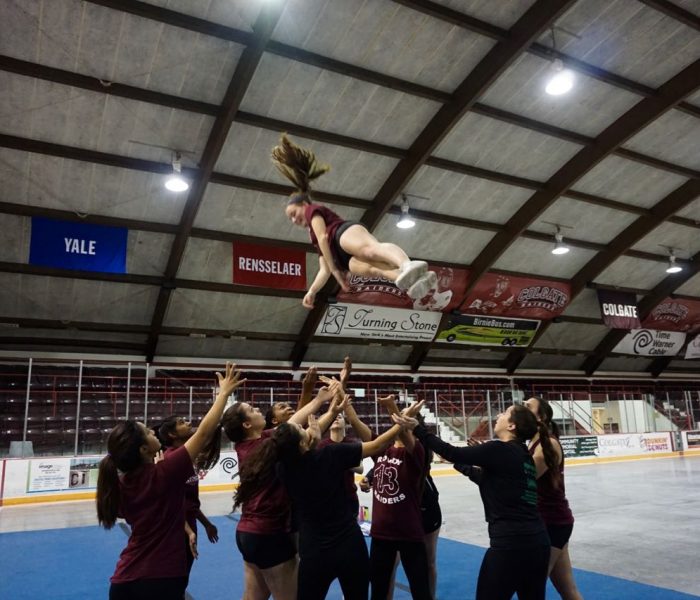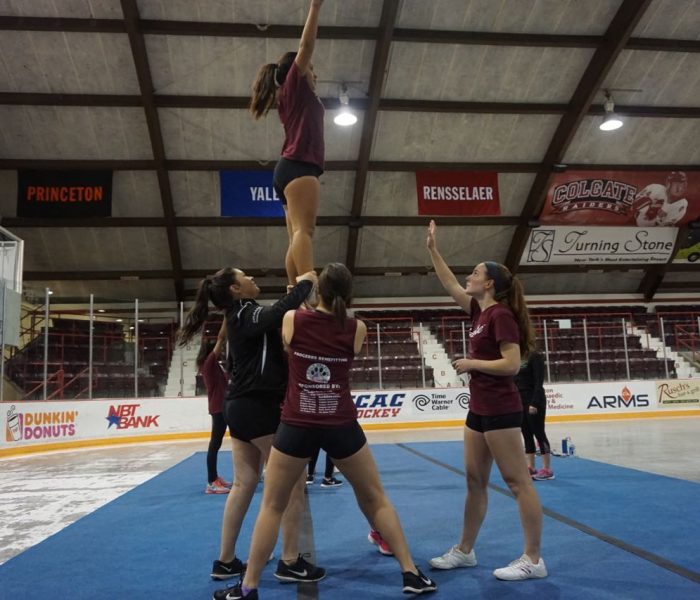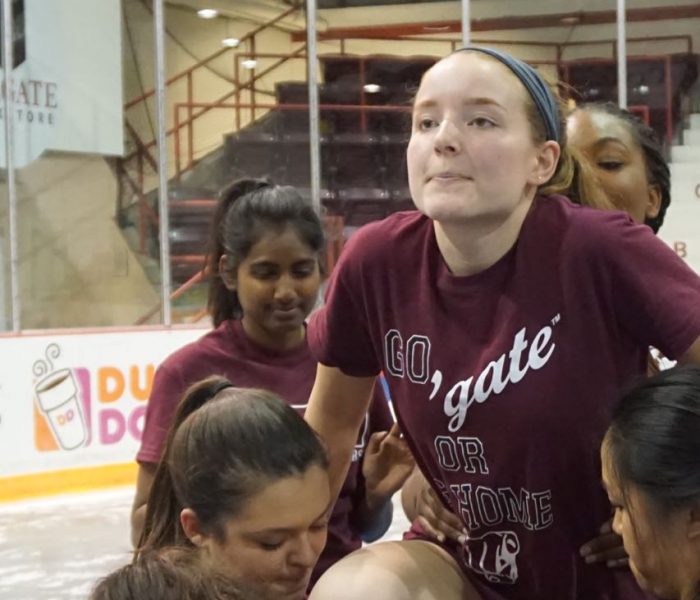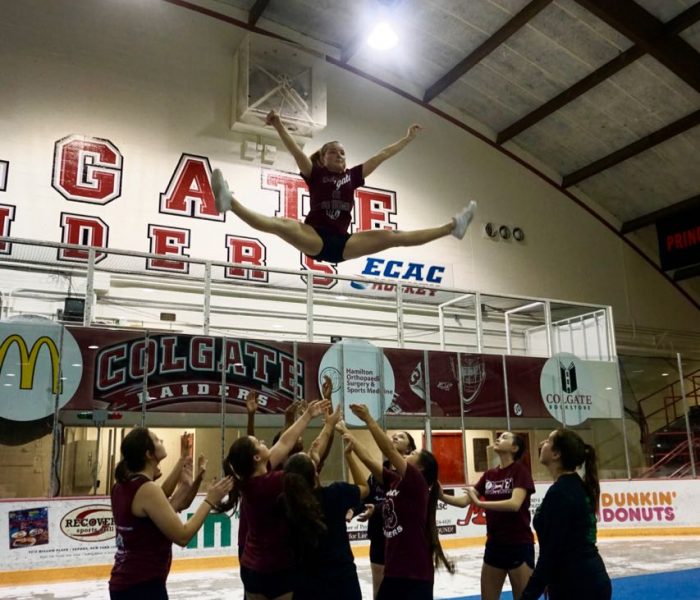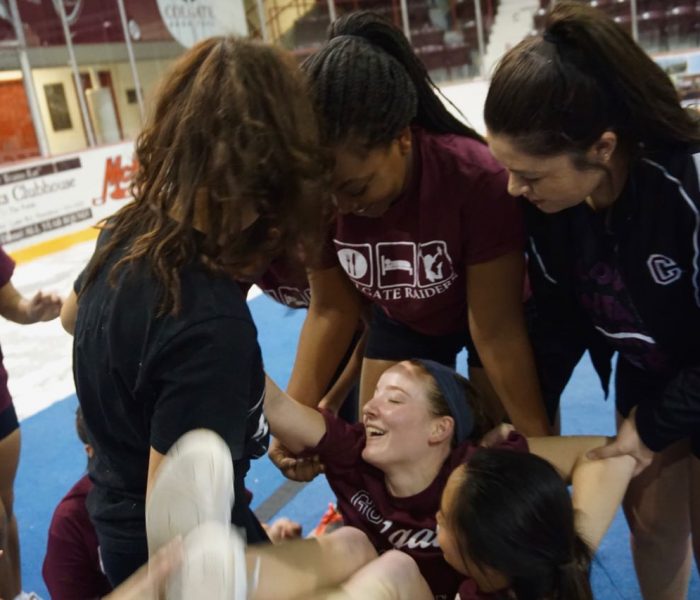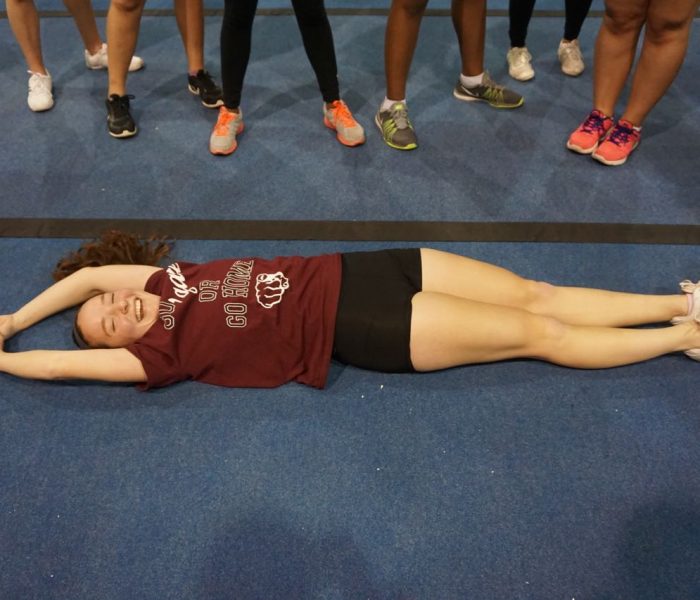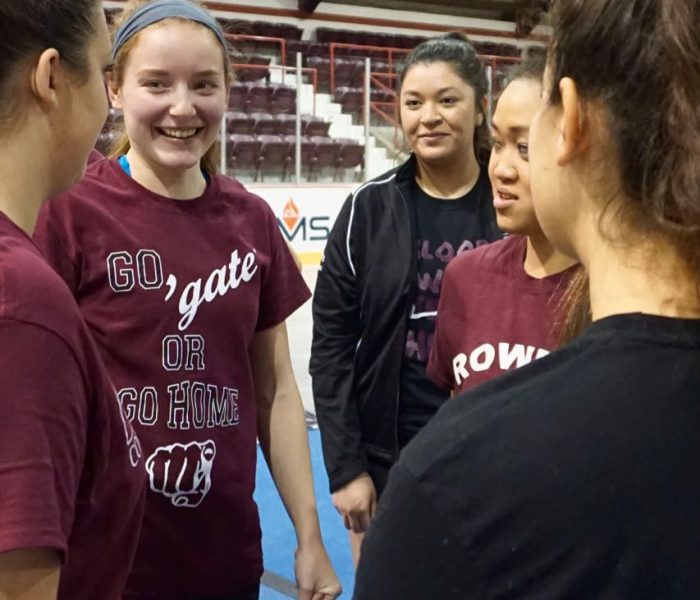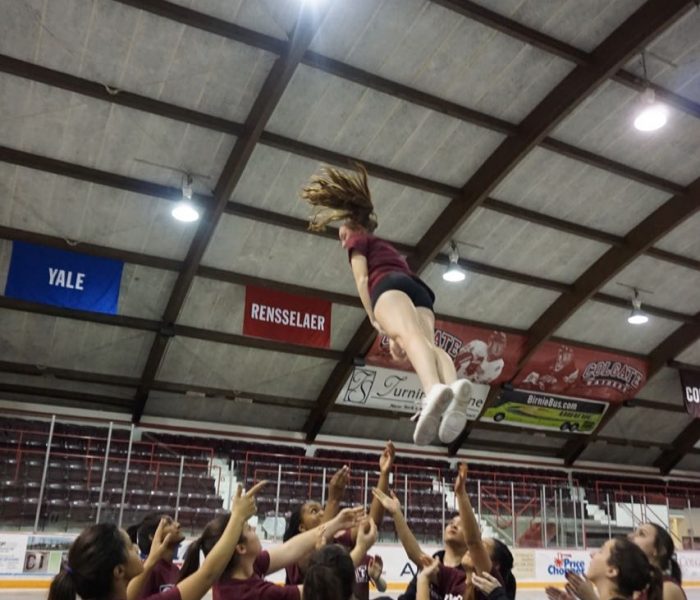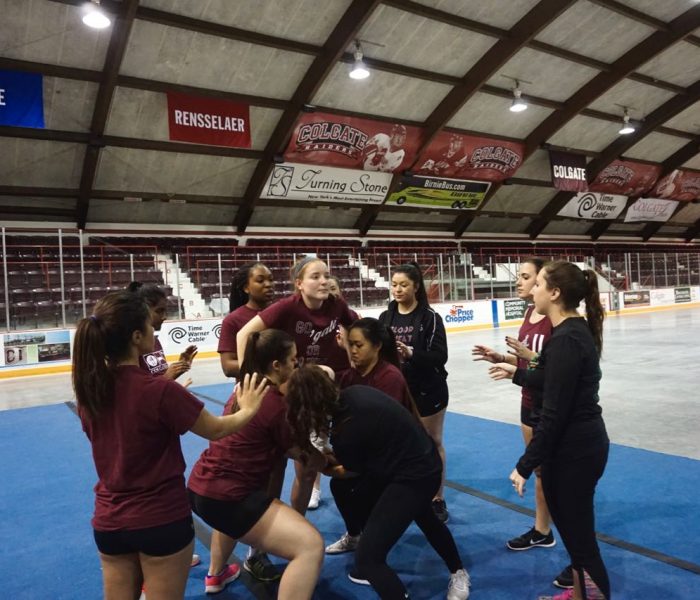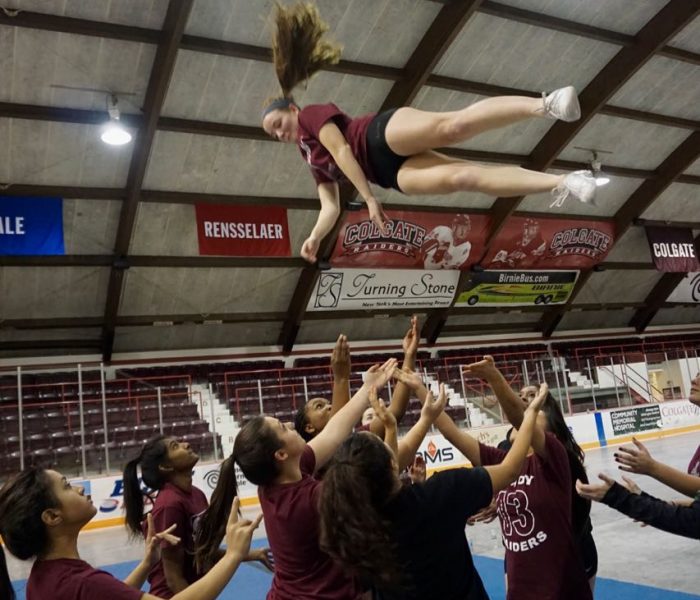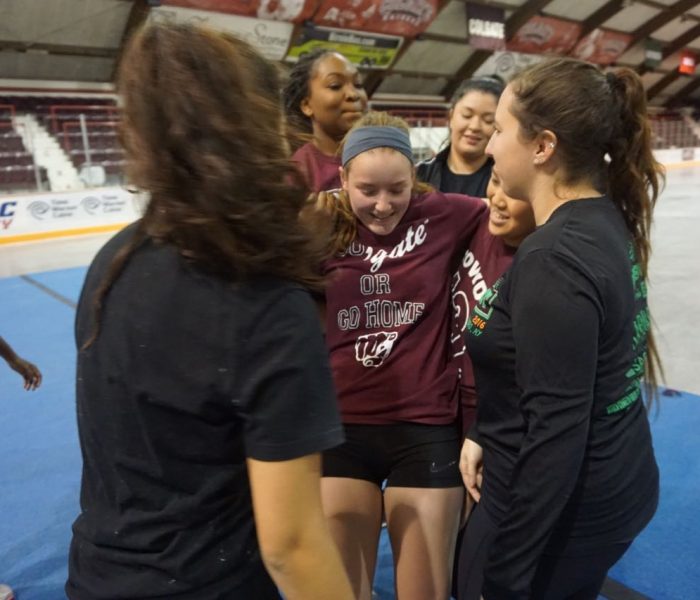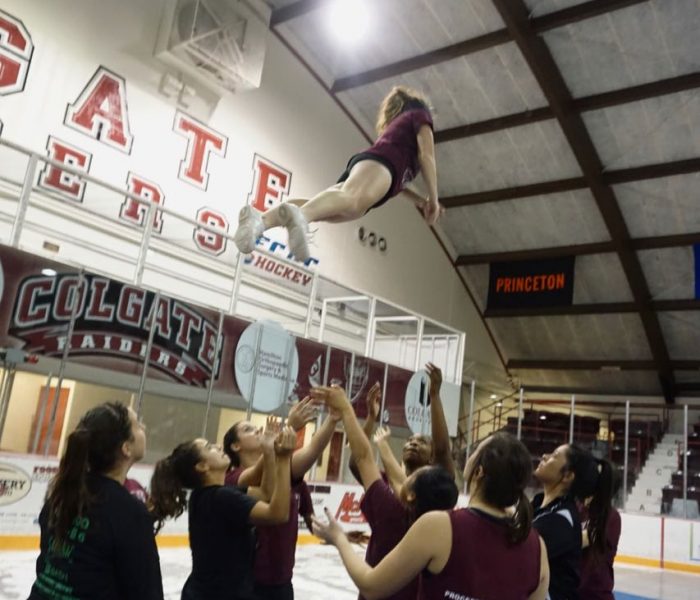In the blog series XYZ with Q, Quanzhi “Q” Guo ’18 visits current and former Benton Scholars to learn about their interests, passions, and accomplishments. In this post, Q went to cheerleading practice with Benton senior Taylor Mooney ‘17.
I didn’t quite know what to make of cheerleading before attending practice with Benton Scholar Taylor Mooney ‘17. I knew the stereotypes, though, and just couldn’t imagine myself in a skirt, holding fluffy pom-poms, wearing a big smile and performing for other people’s enjoyment. Thus I defied the rule of my own blog (for the first time!) by not participating but observing the activity of my interviewee.
Taylor, a Geology major, Film & Media Studies minor, and proud feminist from Lowville, NY, also experienced conflicting thoughts when she joined cheerleading at Colgate. As a gymnast of 14 years, Taylor hoped to maintain her gymnastics skills and be a part of a community with whom she could share that passion. However, Colgate does not have a gymnastics team, so she turned to cheerleading.
The decision was not easy. “I felt by doing cheerleading, I was perpetuating feminine stereotypes and gender roles,” she confessed. She ended up deciding to try it, and it has been a really important learning experience for her. “I realized that believing cheerleading to be a one-dimensional sport was very ignorant and rooted in a lack of experience and a lack of knowledge of its history. It’s certainly difficult to reconcile how cheerleaders are perceived and what it actually means for me to be a contemporary cheerleader, but I have grown a lot in terms of being a feminist in the context of cheerleading,” she said.
And cheerleading turns out not really to be the fun-house depicted in pop culture. Taylor’s team practices three times a week with one to three games per week. My heart skipped a beat as the girls threw Taylor in the air. She then sprang into the air, kicked, turned and tumbled into a cradle of arms.
Cheerleading requires intense trust and cooperation. “Being on the team has given me a really amazing community. Gymnastics is an individual sport. Besides the cheers you get from your teammates, you rely on yourself to do better, athletically. Cheerleading, on the other hand, is team-oriented. As someone who is thrown in the air, I need to have faith that I will be caught by my strong teammates waiting for me on the ground. It requires a lot of encouragement from everyone on the team, despite all the bumps and bruises and mild concussions everyone gets along the way,” Taylor said as she broke into her iconic laughter – loud, genuine and penetrating.
Just as cheerleading encourages trust, it also encourages inclusivity. “We want everyone to have the chance to experience this community we build. We try to make it as inclusive as possible by encouraging any and all to try-out, including those without experience,” Taylor said. Rather than being just an expression of popularity and desirability as many perceive cheerleading to be, Taylor’s cheerleading team is full of pride, confidence and supportiveness.
Taylor also appreciates how cheerleading helps her develop a different side of herself. I would not have believed that she is a cheerleader if it was not for this interview. Always unassuming, Taylor was in her gray Colgate hoodie during the interview. “When I put my uniform on with my other teammates I can take on a different persona and experience a different part of myself, one that is more colorful and outgoing and confident than I would normally describe myself. We all build our confidence by performing for people and engaging with Colgate Athletics supporters, it’s a really important aspect of being on this team,” she said.
However, sometimes it is frustrating for her because cheerleading is seen as a supplement to the sporting events. “Instead of being considered an individual entity, some view us merely as part of the atmosphere. Cheerleading is actually a rigorous sport and is incredibly athletic, requiring intense strength and endurance, with the added need for uniformity through the sharpness of motions and a grasp of balance and tempo,” she said.
Just as Taylor supports her team and the community through cheerleading, she is a super-accessible and caring senior to everyone around her. For example, after the 2016 presidential election, she sent out GroupMes welcoming people “to talk or eat or lay on the floor” at her apartment as a form of support.
Within academics, Taylor is passionate about science outreach. She wants to help others understand science better, especially through the medium of film. In her summer after sophomore year, she interned in the Visual Productions department at the National Aquarium in Baltimore. During her sophomore and junior years, she made videos and taught basic video production for the Advent of Atomic Bomb and BreadX—classes at Colgate produced for the edX platform.
“What is most fun about editing videos is that I get to pick out important clips, ensure a narrative, organize them in a coherent manner, and make sure it is understandable. It’s very much like a brainteaser—trying to figure out what works the best within the confines of the scope of the video. Having a final product and taking ownership are very satisfying,” she said.
Over the past summer, Taylor worked in Wisconsin with the Keck Geology Consortium and assessed the remediation efforts for pollution in the Shadow Lakes.
Knowing how the environment works and why things are the way they are is important to understand the complicated relationship between humans and the natural environment. To Taylor, understanding the sciences is not only important in the science research sphere but also the political sphere. “Science tends to become political, despite it being rooted in fact and intensive research. In the media and politics, many times science is skewed to fit a particular agenda, or the person speaking about it doesn’t necessarily have a real understanding of it. They spew out things that are not necessarily true. That’s why I think it’s important to be a science major when pursuing a career in scientific media– I want an understanding of the science before I try to teach it through film. That way, I can more easily create a video or film that accurately depicts and explains the science behind certain issues,” she said.
Coming from a conservative, small and impoverished community where there are more cows than people, Taylor experienced frustration before leaving for Colgate because, as a more liberal-minded person, she could not understand some of the perspectives people had. “But after I left, I started to see my privileges I wasn’t aware of before and appreciate my people so much more. I now realize it’s less about wanting people who disagree with me to see things my way, but more about trying to open up communication, making sure people are heard on both sides and making resources available to learn from each other. That’s where film comes in—film is an attainable and accessible resource that I can use to do that,” she said.
Among all her jumps during cheerleading practice, Taylor once almost fell onto the ground, yet she was laughing loudly when she opened her eyes and got up for the next routine. Taylor is both independent from and dependent on her team and community. When I asked her to describe herself in three words, she thought really hard for a while . Finally she broke into laughter, and I could’t help laughing with her. Isn’t everything as simple and as complex as that?


